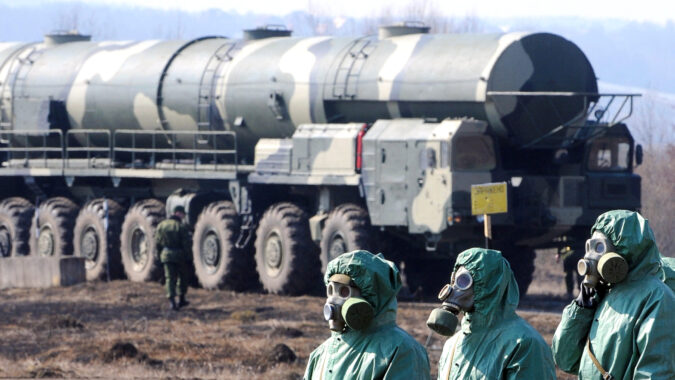The commander of Germany’s military Space Command warned late last week that the purported nuclear weapon that Russia is considering developing for use in space would render space unusable, potentially forever.
Speaking at an event at the Munich Security Conference, Major General Michael Traut weighed in on the recent revelation about the weapon by the U.S. last week.
“If somebody dares to explode a nuclear weapon in high atmosphere or even space, this would be more or less the end of the usability of that global commons [of orbit],” said Traut. “Nobody would survive an action like that — no satellite, either Chinese or Russian and American or European. If somebody calculates rationally, nobody would employ such a weapon in space.”
House Intelligence Committee Chairman Mike Turner (R-OH), who drew public attention to the matter last week, said during an interview over the weekend that part of the reason that he decided to call attention to the classified issue was because he was concerned that the administration was trying to cover-up their inaction on the issue in the same way that they tried to with the Chinese spy balloon.
Lt. Col. “Tony” Vincent, an active duty scientist in the United States Air Force (USAF) who is currently the Director of Advanced Physics Courses at the Air Force Academy, wrote in a September 2022 piece about the dangers that are posed by a nuclear weapon being detonated in space.
Vincent highlighted what happened when the Atomic Energy Commission, in collaboration with the Defense Atomic Support Agency, detonated a nuclear weapon in low Earth orbit back in the Summer of 1962:
The test was codenamed Starfish Prime and it revealed an unfortunate lesson: Even one high altitude nuclear detonation is particularly effective at destroying satellites. Not only were satellites in the line of sight destroyed, but even satellites on the other side of Earth were damaged and rendered inoperable. Starfish Prime damaged or destroyed roughly one third of all satellites in low Earth orbit at the time.
Vincent said that commercial satellites need to become hardened against radiation to avoid being susceptible to a nuclear space weapon, but cautioned that while the cost to do so has fallen, “this practice historically drives the component price up by roughly factors of 10 to 100 while potentially increasing size and mass of the total payload.”
He warned that there were two primary reasons that a country would want to use a nuclear weapon in space: to devastate America’s economy and/or to disrupt the U.S. Military’s space-based assets that it uses for command and control.
“A nuclear explosion in space disproportionately hurts the United States as the largest single investor in space capabilities,” he wrote. “The United States nets almost $200 billion per year of real gross output from its space assets. Even though military satellites are designed to withstand a harsher charged particle environment, radiation hardening is not a magic cloak of invincibility. Military space assets will be degraded over time from the artificially amped radiation belt created from the nuclear detonation, meanwhile commercial satellites in low Earth orbit will be the first to fail from continually passing through these particle hot spots. Most satellites with a line of sight to the nuclear detonation will be destroyed from the resulting x-rays. Military space capabilities for command and control along with reconnaissance assets may still function for a period following the detonation, but the economic impact of degraded informational space products will be immediate.”
Vincent further wrote that the threat that a nuclear space weapon could be used is higher than what most people likely think because a nuclear detonation in space against infrastructure would not necessarily mean that the U.S. would respond with a nuclear strike against the aggressor:
Once an adversarial nation with a disadvantage in space capabilities detonates a nuclear weapon in this domain, there is no benefit to respond with a similar attack. This act would further degrade space-based assets…
The attacked nation, then, must consider responding with conventional or nuclear weapons on Earth. Targeting cities and military installations with nuclear weapons is not an in-kind response to the initial action of nuking space and represents another significant escalation in the conflict. Space assets are not on par with human lives. Further, the attacking nation will also have nuclear weapons in reserve, and with the right mix of forces can hold targets at risk. Therefore, the attacked nation would have to weigh escalating to nuclear weapons use, knowing that it would invite a nuclear response on targets in the homeland. The obvious response is to signal that the use of nuclear weapons in space would be treated as a nuclear attack on Earth, but an adversarial nation could consider such a threat non-credible.
A nation may also be deterred from acting because every nation in the world is dependent upon space products to some degree. Therefore, using a nuclear weapon in space would be “self-harm.” However, as the history of war reveals, nations choose self-harm, such as when they collapse their own bridges and burn fields, to prevent an invader from gaining ground. Nuclear weapons are at the pinnacle of threat escalation, so the use of one is a sign of desperation with diminishing alternative options.
Related: House Intel Republican Warns Russian Space Weapon May ‘Blind’ U.S. Economy And Military

